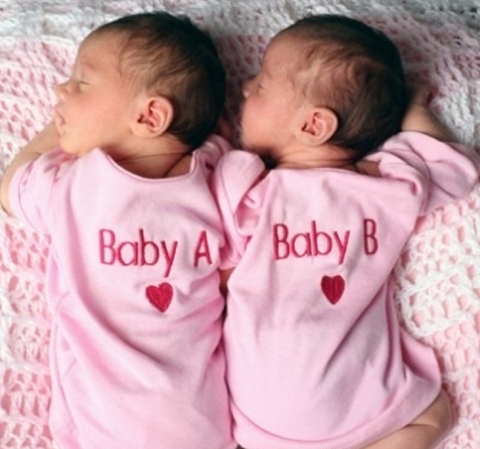(单词翻译:单击)
Twins, and the reasons behind why some people have them and others don't, has fascinated scientists for centuries.
双胞胎本身,以及为什么有的人能生出双胞胎有的人却不能,几个世纪以来一直是科学家感兴趣的问题。
They are relatively common - occurring once in 100 pregnancies - and while the cause of non-identical twins has been linked to genetics, the genes involved had not been identified until now.
双胞胎近年来相对来说更加普遍了,每100个产妇中就会有1位怀有双胞胎。虽然已经有证据证明异卵双生与遗传因素有关,但至今还没有人成功鉴别出自发性异卵双生的基因。
Researchers have pinpointed two gene varians related to twinning, and one can play a major role in the age of a girl's first period, age at menopause and infertility.
研究人员已经发现了两种与双胞胎有关的基因变异,其中一种对女孩的月经初潮年龄、更年期年龄与生育能力起着非常重要的作用。

The breakthrough was made by Dr Hamdi Mbarek and Professor Dorret Boomsma from the Vrije Universiteit in Amsterdam.
这项重大突破是由阿姆斯特丹大学的哈姆迪·穆巴拉克博士和多雷特·博穆萨教授发现的。
The first gene variant is close to the gene coding for the secretion of follicle stimulating hormone, called the FSHB gene. This hormone is released by the pituitary, the small brain region that governs almost all major hormonal events in the body.
第一个基因的突变与分泌卵巢激素的被称为FSHB的基因密码相近。该激素是由负责着几乎人体所有主激素分泌的脑垂体分泌的。
The second variant relates to the so-called SMAD3 gene and is likely to be involved in the way the ovaries respond to follicle stimulating hormone.
第二个突变与所谓的SMAD3基因相关,可能与卵巢对卵泡刺激素的反应方式有关。
Both variants result in the multiple follicle growth needed for the development of non-identical twins.
这两个突变都会导致多重卵泡的生长,这是异卵双胞胎的基础条件。
Non-identical twins, medically known as dizygotic, develop from two separate eggs from separate follicles fertilised by separate sperm cells. Whereas identical twins develop from one embryo that splits in half, dizygotic twinning thus starts with a multiple ovulation.
医学上定义的异卵双胞胎,是指两个不同卵泡中单独的两个卵子,和两颗精子结合发育而成。与之相反,同卵双胞胎是由一个卵细胞一分为二发育而来的,因此异卵双胞胎的起因是超数排卵。
Discovery of the main genes behind the mystery of spontaneous dizygotic twinning was long awaited, and is of great scientific interest and clinical importance,' said Professor Boomsma.
博穆萨教授表示:“人类早就希望能解开自发性异卵双胞胎的秘密,这一直是科学界和临床研究中重要的课题。”
However, there are still more genes to be found that influence spontaneous dizygotic twinning.
不过,目前还有很多与自发性异卵双胞胎有关的基因有待发现。


